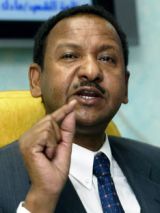Sudan tells the US it will not offer concessions “for free” to normalize ties
January 20, 2008 (KHARTOUM) — Sudan’s presidential adviser told the top US diplomat in Khartoum that his government will not normalize relations with Washington “for free”.

“Every concession in our end should be met with a similar concession from the US side” Ismail told reporters after his meeting with Fernandez.
The growing strain in relations between the two countries comes amidst refusal by Sudanese authorities to admit equipments stuck at Port Sudan needed for the construction of new US embassy in Khartoum.
Last week Sabir Mohammed Hassan, governor of Sudan Central Bank, asked the visiting US Assistant Secretary of State for African Affairs Linda Thomas Greenfield, specifically to return money confiscated following a ruling by U.S. court that ordered Khartoum to pay some $8 million to the families of U.S. sailors killed in the bombing of an American naval destroyer seven years ago in Yemen.
The newspaper said that Greenfield turned down Sudan’s request and said that Washington may abandon the new embassy project which incurred $60 million in costs to date.
Hassan on his end vowed not to give the US embassy equipments any special consideration. He told the US official that the Sudanese embassy in Washington gets audited on a regular basis which costs Khartoum over $3,000 monthly.
Ismail said that his government has fulfilled demands by Washington to normalize relations including human rights, relations with neighboring countries and democratic transition.
“We have not witnessed any goodwill initiatives by the US but rather more sanctions” he added.
The Sudanese official said that the US administration replaces its envoys after they develop an understanding with Khartoum.
Ismail was referring to US Special envoy Andrew Natsios who resigned from his post and was succeeded by Richard S. Williamson. The Sudanese government at the time made statements indicating their contentment with Natsios resignation.
However Ismail’s statements signal a reversal in Khartoum’s position regarding the replacement of Natsios. Williamson is due to visit Khartoum in the coming weeks to meet with Sudanese officials.
There has been a growing frustration among Sudanese officials with regards to Washington’s unwillingness to normalize ties between the two countries.
Last May the US president George Bush ordered stiffened sanctions on Sudan that will bar 31 companies controlled by the government from doing business in the U.S. financial system as well as sanctions on four Sudanese individuals, including two senior Sudanese officials and a rebel leader suspected of involvement in the Darfur violence.
Sudanese officials have acknowledges the negative impact of sanctions on their economy which prompted their central bank to convert their reserves from dollar to Euro.
Last month US president Bush signed into a law the “Sudan Accountability and Divestment Act of 2007″ passed by the Congress.
The bill aims at providing protection from lawsuits to State and local divestment efforts in Sudan to sanction it over the Darfur crisis labeled genocide by the US administration.
The bill also allows asset managers to divest from foreign companies operating in Sudan without being deemed in violation of their fiduciary duty. Also no government agency shall grant federal contracts to companies believed to be conducting business in Sudan unless they certify otherwise.
The Sudan Accountability and Divestment Act of 2007 specifically targets the main sources of revenue of Khartoum; oil, power production, mining and military equipment. It will only impact foreign companies since most American businesses are prohibited from dealing with Sudan under executive order issued in 1997 by former president Bill Clinton.
(ST)
